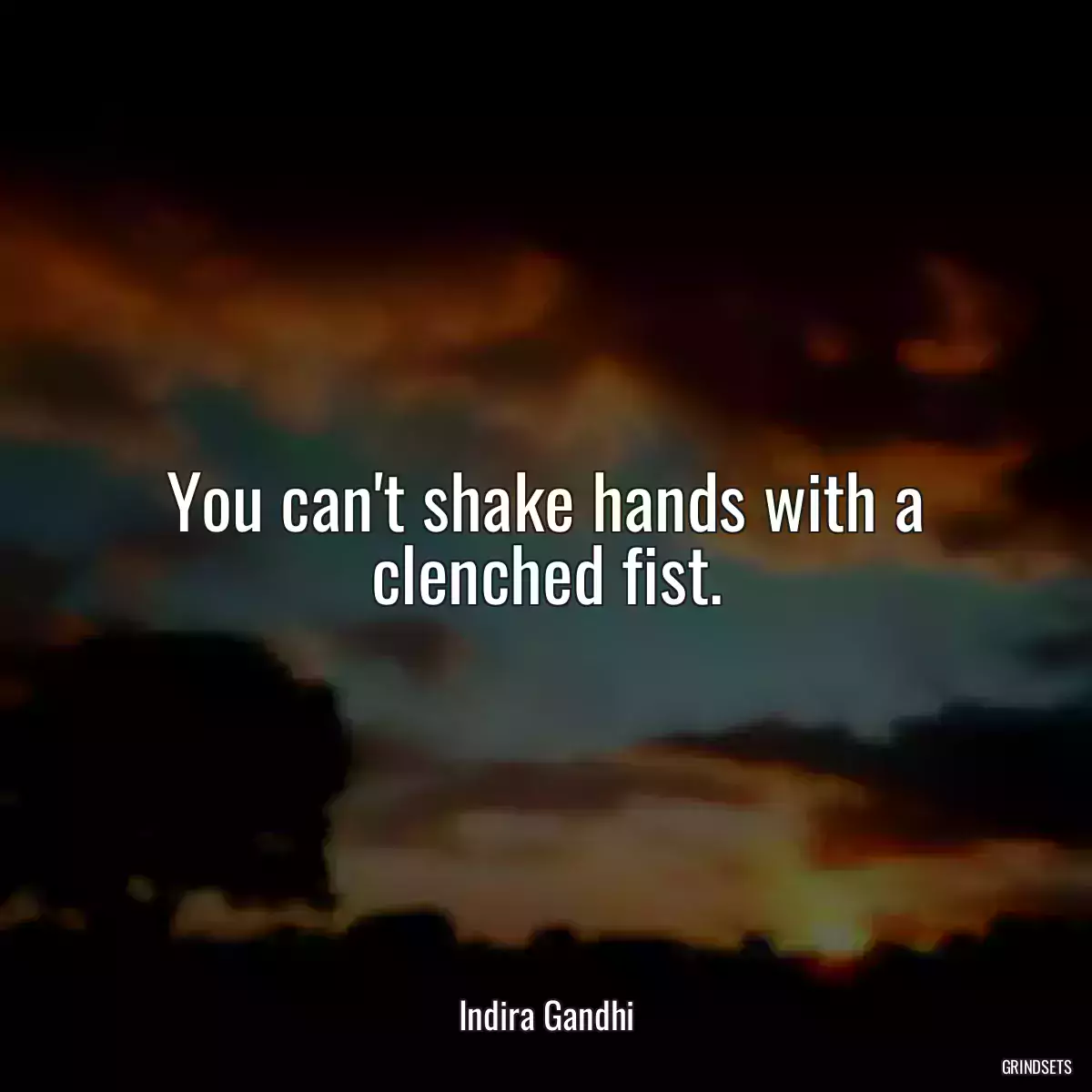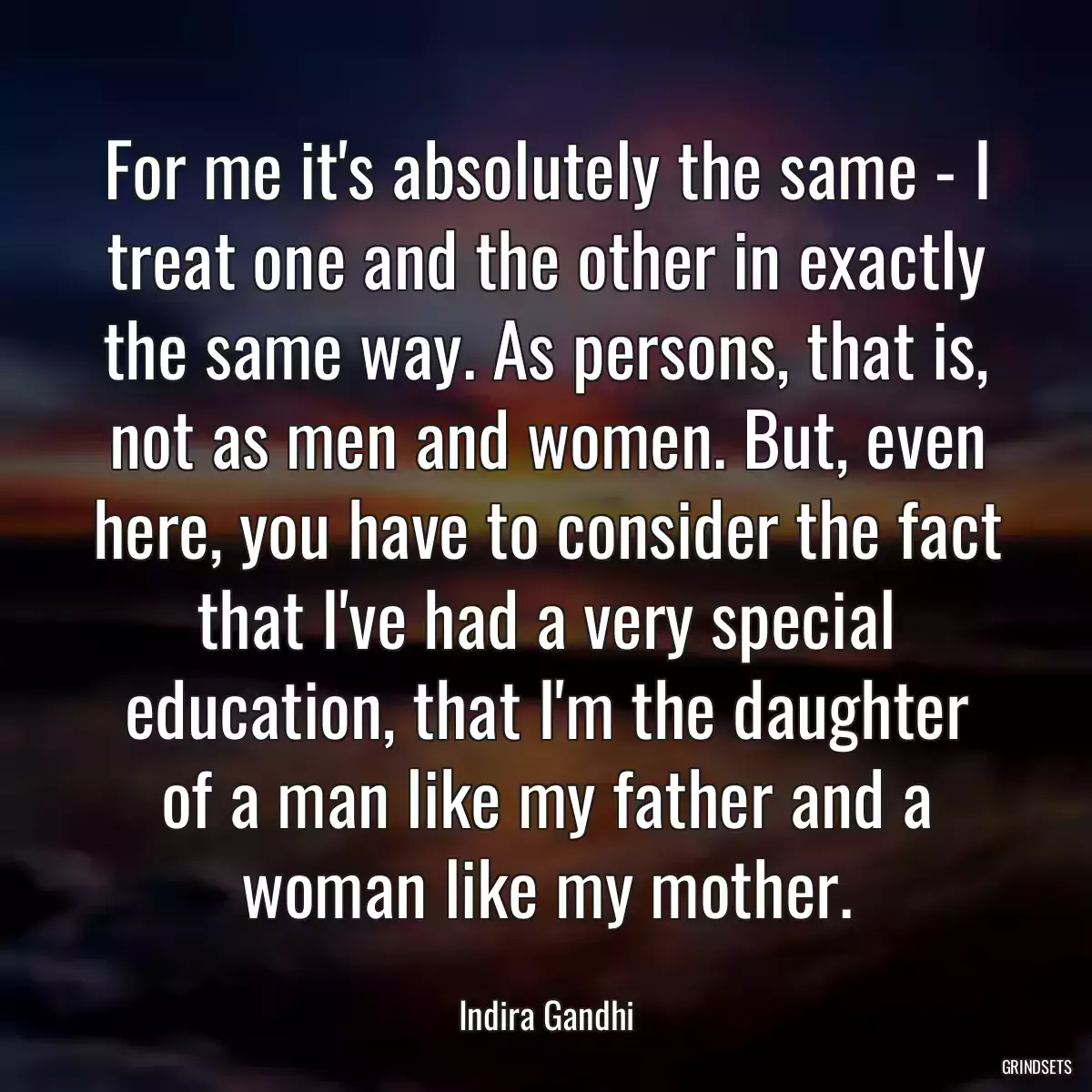
Quotes Indira Gandhi
Find dozens of Indira Gandhi with images to copy and share.

I think basically I'm lazy, but I have a housewife's mentality when I go about my job.
My theory is that men are no more liberated than women.
I know you were surprised when, after the fall of Dacca, Pakistani and Indian officers shook hands. But do you realize that, up until 1965, in our army and the Pakistani one you could come across generals who were brothers? Blood brothers, sons of the same father and the same mother.
You may also like
I've always been able to do what I wanted. On the other hand, my mother was. She considered the fact of being a woman a great disadvantage. She had her reasons. In her day women lived in seclusion - in almost all Indian states they couldn't even show themselves on the street.
Muslim women had to go out in purdah, that heavy sheet that covers even the eyes. Hindu women had to go out in the doli, a kind of closed sedan chair like a catafalque. My mother always told me about these things with bitterness and rage.
[My mother] was the oldest of two sisters and two brothers, and she grew up with her brothers, who were about her age. She grew up, to the age of ten, like a wild colt, and then all of a sudden that was over. They had forced on her her 'woman's destiny' by saying, 'This isn't done, this isn't good, this isn't worthy of a lady.'
At a certain point the family moved to Jaipur, where no woman could avoid the doli or purdah. They kept her in the house from morning to night, either cooking or doing nothing. [My mother] hated doing nothing, she hated to cook. So she became pale and ill, and far from being concerned about her health, my grandfather said, 'Who's going to marry her now?' So my grandmother waited for my grandfather to go out, and then she dressed my mother as a man and let her go out riding with her brothers.
Until the day she died, my mother continued to fight for the rights of women. She joined all the women's movements of the time; she stirred up a lot of revolts. She was a great woman, a great figure. Women today would like her immensely.

Not only my parents but the whole family was involved in the resistance - my grandfather and grandmother, my uncles and aunts, my cousings of both sexes. So ever so often the police came and took them away, indiscriminately. Well, the fact that they arrested both my father and mother, both my grandfather and grandmother, both an uncle and an aunt, made me accustomed to looking on men and women with the same eyes, on an absolute plane of equality.
It's not right to say that my father influenced me more than others, and I wouldn't be able to say whether my personality was formed more by my father or my mother or the Mahatma [Gandhi] or the friends who were with us.
I began to associate with Mahatma Gandhi when he came and went in our house - together with my father and mother he was on the executive committee. After independence I worked with him a lot - in the period when there were the troubles between Hindus and Muslims, he assigned me to take care of the Muslims. To protect them.
I was a perfect housewife. Being a mother has always been the job I liked best. Absolutely.
To be a mother, a housewife, never cost me any sacrifice - I savored every minute of those years.
I was a welfare worker for the Indian Council for Child Welfare. I'll tell you a story. Rajiv was only four years old at that time, and was going to kindergarten. One day the mother of one of his little friends came to see us and said in a sugary voice, 'Oh, it must be so sad for you to have no time to spend with your little boy!' Rajiv roared like a lion: 'My mother spends more time with me than you spend with your little boy, see! Your little boy says you always leave him alone so you can play bridge!' I detest women who do nothing and they play bridge.
Ability is not always gauged by examination.
If we offer something to Bangladesh, it's obvious that Bangladesh is offering something to us. And why shouldn't Bangladesh be able to keep its promises? Economically it's full of resources and can stand on its feet. Politically it seems to me led by trained people. The refugees who took shelter here are going home.
You may also like
![We couldn\'t keep ten million refugees on our soil; we couldn\'t tolerate such an unstable situation for who knows how long. That influx of refugees wouldn\'t have stopped - on the contrary. It would have gone on and on and on, until there would have been an explosion. We were no longer able to control the arrival of those people, in our own interest we had to stop it! That\'s what I said to Mr.[Richard] Nixon, to all the other leaders I visited in an attempt to avert the war.](/fotos/79/796e2f57fd87b9b44251e692e269f0bf.webp)
We couldn't keep ten million refugees on our soil; we couldn't tolerate such an unstable situation for who knows how long. That influx of refugees wouldn't have stopped - on the contrary. It would have gone on and on and on, until there would have been an explosion. We were no longer able to control the arrival of those people, in our own interest we had to stop it! That's what I said to Mr.[Richard] Nixon, to all the other leaders I visited in an attempt to avert the war.
Do you know why I won the last elections? It was because the people liked me, yes, because I had worked, yes, but also because the opposition had behaved badly toward me. And do you know why I won this war? Because my army was able to do it, yes, but also because the Americans were on the side of Pakistan.